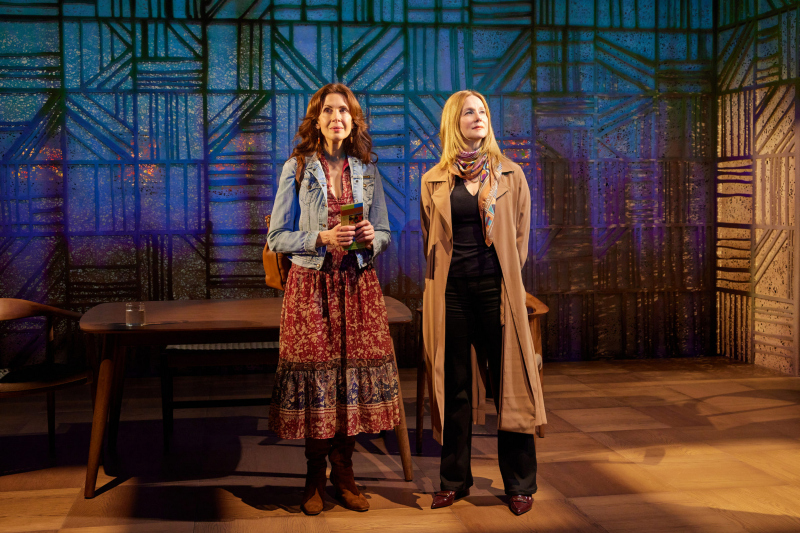Summer, 1976
By David Auburn; Directed by Daniel Sullivan
Produced by Manhattan Theatre Club
Broadway, Play
Runs through 6.18.23
Samuel J. Friedman Theatre, 261 West 47th Street
by David Kaufman on 5.3.23
 (L-R) Jessica Hecht and Laura Linney in Summer, 1976. Photo by Jeremy Daniel.
(L-R) Jessica Hecht and Laura Linney in Summer, 1976. Photo by Jeremy Daniel.
BOTTOM LINE: Two outstanding actors give memorable performances as two friends who reflect back on how they met.
One of the first lessons an actor learns for a live performance is to vocally project to the rear of the auditorium without a microphone. It’s a lesson that both Laura Linney and Jessica Hecht learned well, as they masterfully breathe life into Diana and Alice, the characters they respectively portray in Summer, 1976. For those who are too young—or too old—to recall, the actual summer of 1976 marked the United States Bicentennial, celebrated with a series of festivals and fireworks. While at the time it was everywhere, this hoopla gets only a glancing mention in David Auburn’s new play, which occurs at a much smaller scale, with self-contained references and plot developments that keep tumbling over one another.
In the beginning, Diana disparagingly refers to Alice as “this sleepy-eyed little hippie” who’s carrying around “a sun-bleached paperback copy” of James Clavell’s “depressingly middlebrow novel Shogun.” She’s also wearing a predictable peasant dress, aptly designed by Linda Cho. As one would expect of the playwright of Proof, Auburn’s Summer, 1976 proves literate to the nth degree, while it proceeds also to relate the tale of Holly and Gretchen, Diana and Alice’s young daughters. Diana and Alice made the two-hour drive from Columbus to Cleveland—with a side trip to Sandusky—Ohio, twenty-five years ago.
An artist as well as an art instructor, Diana claims that she is “in a limited, but very real sense, known,” expressing that last word with the customary hubris that helps define her character even as it confirms Linney’s verbal prowess. The play that contains her is also a study in contrasts, as it pits Diana against Alice and relates their story in period references, such as Planet of the Apes, Charlie’s Angels, and the Emerson String Quartet. (Greg Pliska’s background music is thankfully kept to a minimum.) It also lapses in and out of narrative techniques, as Diana and Alice take turns addressing us and each other directly. And if Diana always seems controlled and controlling, Alice is rather dizzy and ditzy, just as their home environments are described as “ordered” versus “messy.”
They both partake of a joint Alice removes from her purse, even as she claims Diana “fucking bogarted” it “for like five minutes” when they visited a Paul Klee retrospective at MOMA. Auburn’s vernacular proves as appropriate and convincing as the rest of his achievements. On the other hand, though we’re told Diana “had family money,” that doesn’t begin to explain why she paid $300 for a desk Alice admired.
As it unfurls on John Lee Beatty’s handsome set, Summer, 1976 is lit with an impressionistic and vivid realism by Japhy Weideman, who’s well-abetted by Hana S. Kim’s projection designs, all under Daniel Sullivan’s assured supervision. It’s a must-see for anyone interested in memorable performances or an investigation of how we get from one place to another with our baggage intact.
(Summer, 1976 plays at the Samuel J. Friedman Theater, 261 West 47th Street, through June 18, 2023. The running time is 90 minutes, no intermission. Performances are Tuesdays at 7; Wednesdays at 2 and 7; Thursdays at 7; Fridays at 8; Saturdays at 2 and 8; and Sundays at 2. Tickets are $84 - $215.50 and are available at telecharge.com or by calling 212-239-6200. For more information visit manhattantheatreclub.com.)
Summer, 1976 is by David Auburn. Directed by Daniel Sullivan. Scenic Design by John Lee Beatty. Costume Design by Linda Cho. Lighting Design by Japhy Weideman. Sound Design by Jill BC Du Boff. Projection Design by Hana S. Kim. Original Music by Greg Pliska. Production Stage Manager is James FitzSimmons.
The cast is Laura Linney and Jessica Hecht. Understudies are Judith Lightfoot Clarke and Finnerty Steeves.

